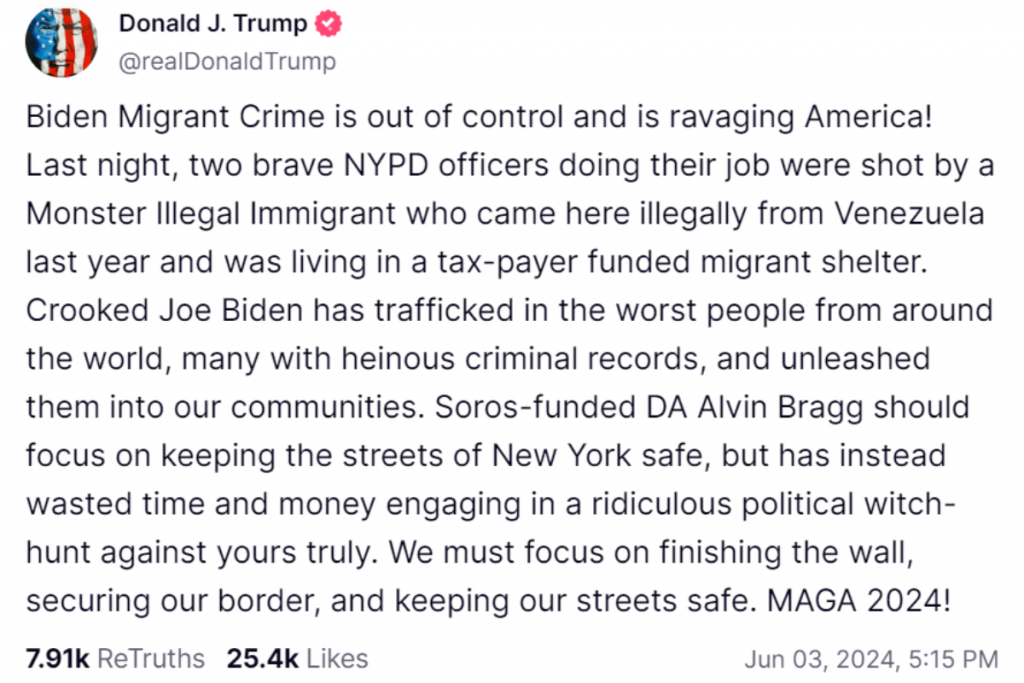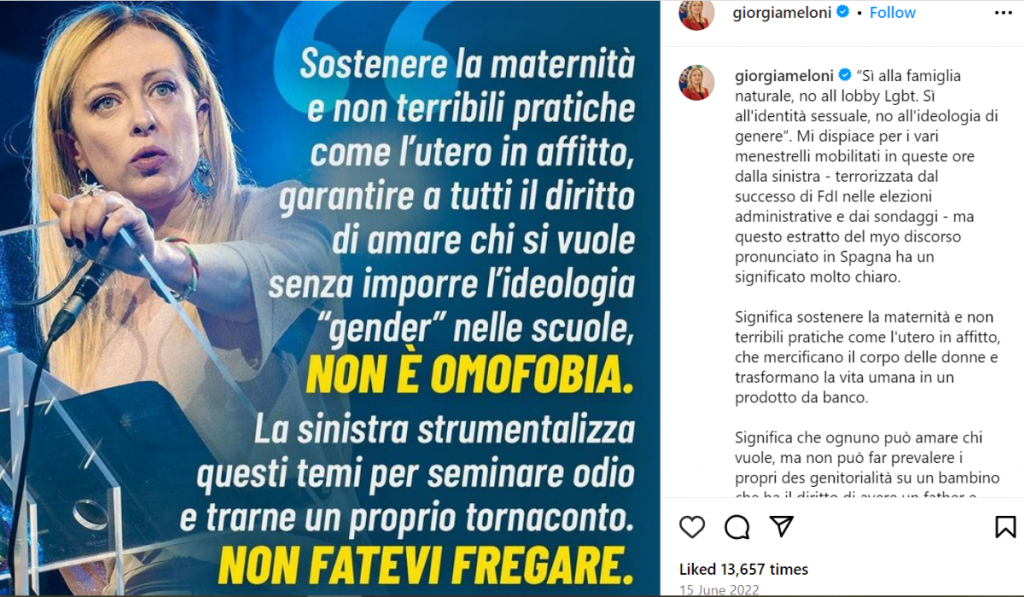Jacob Wentz analyses populist rhetoric and communication strategies in the election campaigns of Donald Trump and Giorgia Meloni. Both leaders adopt similar approaches, criticising traditional media, personalising politics, and using language that marginalises immigrants and the LGBTQ+ community. We should not, he argues, underestimate the power of their rhetoric
Election campaigns are often seen as three-player games involving the candidates, the media, and the voters. How political actors represent themselves, in addition to how they are represented in media coverage, influences voter preference and electoral support.
Populist leaders appear to have grasped this idea better than most politicians, engaging in rhetoric that is controversial, personal, and exclusionary. Former US president Donald Trump and current Italian PM Giorgia Meloni are experts in the field.
The Guardian, The New York Times and other major media outlets have been critical of Trump's and Meloni’s messaging during their respective election campaigns.
The Guardian condemned Trump’s anti-immigration rhetoric as racist, extremist, and dehumanising. The paper branded his statements on the Ukraine-Russia war as menacing and isolationist. The New York Times’ coverage often publishes Trump’s false statements alongside verified facts that prove him wrong. Editorials have argued that Trump is unfit to lead, and described him as selfish, dishonest, and dangerous.
The Guardian suggested that Meloni's nostalgia for Italy’s fascist traditions threatens European values. It has also criticised her unrelenting rhetoric on issues related to immigration and LGBTQ+ rights. The New York Times has described her as a far-right leader who appeals to a nationalist base while presenting herself as moderate on the international stage. Despite Meloni’s attempts to distance herself from fascism, The New York Times has raised concerns about her party’s history and its potential to erode liberal norms.
Trump regularly dismisses such media outlets as purveyors of fake news and as 'the enemy of the American people'. Meloni has accused journalists of sabotaging their homeland. Both leaders have filed defamation lawsuits to intimidate media critics.
As the Fourth Estate, the media reflects and enforces changing social norms. Journalists hold those in power accountable according to these norms, even if, as Baris Cayli Messina notes on this blog site, they sometimes fall short.
Media criticism of a political actor doesn't necessarily reduce public support for them. Instead, it can galvanise a politician’s base and deepen their supporters' distrust of the media
Negative media coverage of political actors typically reduces public support for them. But it can also have the opposite effect, galvanising their support base and deepening supporters' distrust of the media. Populist politicians' criticism of the media strikes a chord with supporters who feel left behind by social progress and perceive mainstream journalism as being biased towards elites.
Radical-right populists exploit these fears further by invoking nostalgia, as evidenced in Trump’s 'Make America Great Again' slogan and – from the Mussolini era – Meloni’s 'God, homeland, family'.
Political communication has developed a ‘pop’ component in which politics becomes a form of entertainment. Like celebrities, politicians share social media posts that come across as exclusive and exceptional, yet at the same time relatable to their grassroots followers. This is 'personalisation politics', in which individual leaders, rather than political parties, wield the real influence.
Successful personalisation politics relies upon the charisma of the leader, and their intimate bond with the electorate. This style of politics discourages deliberation, eroding social cohesion and fuelling polarisation.
Trump and Meloni use social media to develop an intimate bond with their grassroots followers
Social media bypasses traditional news gatekeepers, providing unfettered access to political audiences. Trump launched his own platform, Truth Social, as a direct conduit to his fanbase. Meloni doubled her followers by sharing intimate posts about her family life, including pictures of her daughter:

Revealing aspects of their personal lives renders these leaders more emotionally appealing to voters. Party politics, the traditional channel of representative democracy, has become a means of personalisation. Rather than fostering a range of ideas, parties position individual leaders as the focus of their identities.
Trump and Meloni both rely on us-versus-them rhetoric typical of populism. Marginalising the out-group of perceived adversaries strengthens the loyalty and identity of the in-group. This binary logic thrives on the simplification, speed, and polarisation of social media. Both leaders focus their criticism on elites, immigrants, and the LGBTQ+ community.
Populist leaders gain support by playing up the perceived antagonism between 'corrupt elites' and a 'virtuous people'.
Meloni capitalised on anti-establishment sentiments that intensified during the pandemic. She has shared posts with catch-all themes such as honesty versus corruption and competence versus incompetence, and stokes fear among voters by claiming that meritocracy that has deteriorated under the Italian 'radical chic' left.
Trump's 2016 campaign used similar messaging. Recently, however, Trump has intensified his rhetoric to focus on revenge. He has launched hundreds of personal attacks online and promised that a second Trump administration would weaponise the federal government. He further casts his political opponents as vote-rigging cheaters.
Trump has suggested that immigrants are violent criminals. He shares news stories that amplify public fears, and blames the opposition for enabling crimes supposedly committed by immigrants. Trump refers to immigrants as Biden Illegals, and claims they are 'imported and sheltered by Democrats'. Indeed, he falsely asserted that Democrats want open borders so that immigrants can vote and steal the election from him.

Meloni also likens immigrants to criminals, but differentiates between people fleeing conflict and irregular economic migrants. Paradoxically, she invokes feminist rhetoric to justify exclusionary policies, arguing that women’s safety from predatory migrant men depends on preserving traditional Western values related to the family and nationhood.
Trump and Meloni both claim that pro-immigration measures are part of a left-wing conspiracy to replace the native population with immigrants
Nativism is a pillar of populist radical-right ideology, and Trump and Meloni both claim that pro-immigration measures are part of a left-wing conspiracy to replace each country’s people with immigrants.
Trump derides gender-affirming care for trans people and the equal treatment of transgender athletes as 'transgender insanity'. He justifies these views by claiming he is protecting children, and even alleges that the concept of transgenderism itself was invented by the radical left.
Meloni advocates for traditional family values, and is deeply critical of the 'LGBT lobby'. Her political discourse supports traditional models of femininity and the natural family as fundamental to social order. Meloni's stance vilifies LGBTQ+ people, and she backs up her discourse with policies that restrict LGBTQ+ freedoms.

Personalisation and vilification are powerful rhetorical strategies for populist leaders during election campaigns. These tactics fuel polarisation, undermine inclusive democratic practices, and inflict severe harm on the communities they marginalise. We underestimate their power at our peril.